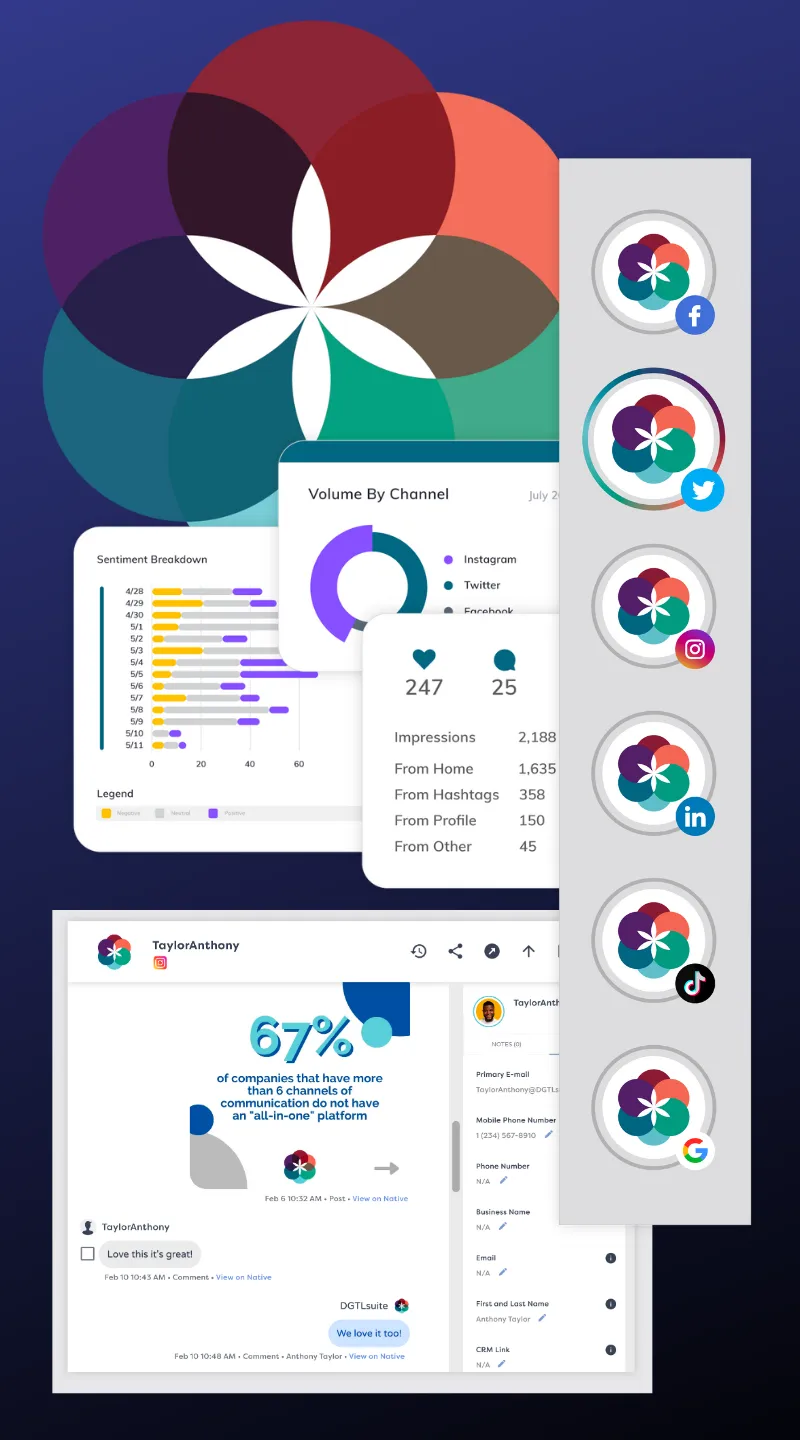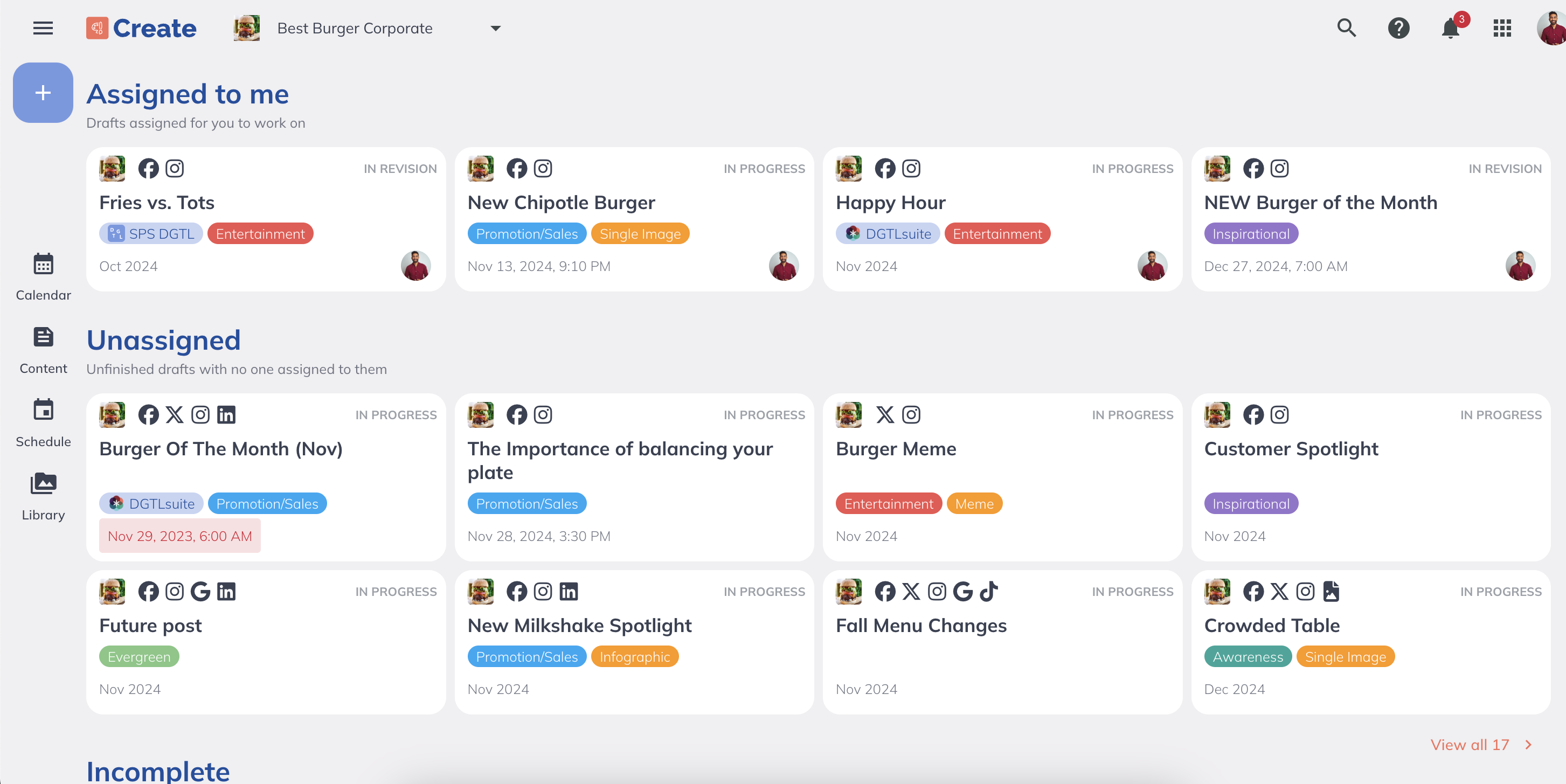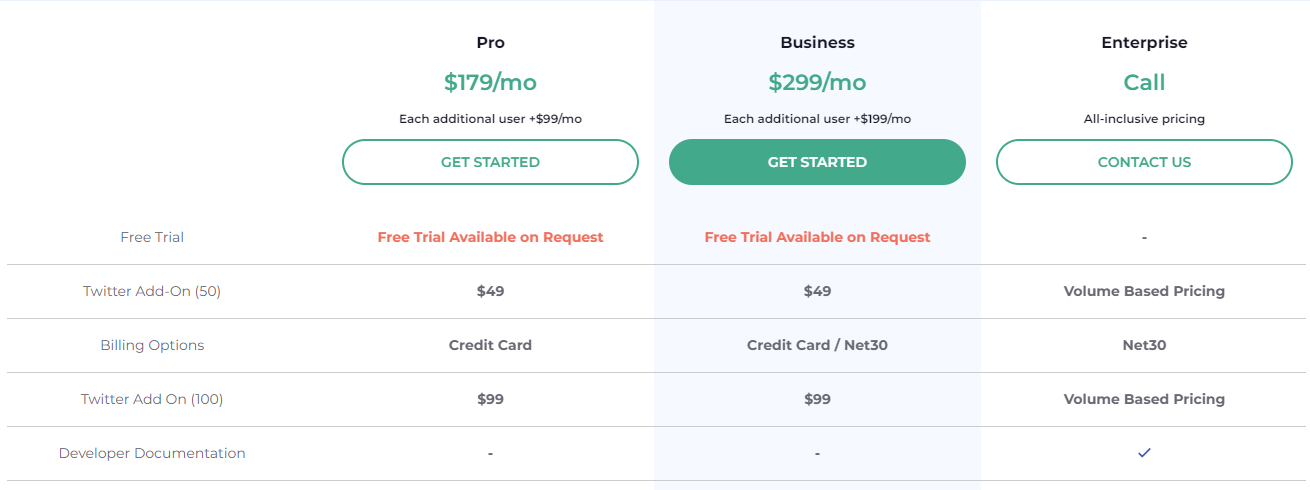Managing your brand’s reputation on social media can be a challenge. With conversations happening non-stop across platforms, it’s tough to keep track of what people are saying about your brand, competitors, or industry.
That’s where social media monitoring tools come in—they help you stay on top of mentions, engage with your audience, and make smarter decisions.
But here’s the catch: not all tools are created equal. Some lack real-time updates, leaving you in the dark when things go south. Others can be too complex or pricey, making it hard to find the right fit.
In this guide, we’ll explore what these tools do, their key benefits, and highlight the best options to help you choose the right one for your business!
What Are Social Media Monitoring Tools?
Social media monitoring tools help you track what people are saying about your brand, products, or even your competitors on platforms like Facebook, Twitter (X), Instagram, and LinkedIn.
They collect data from these channels to give you insights into your audience’s opinions, comments, and feedback in real time.
These tools are useful for understanding what’s getting attention, responding to customer questions or concerns, and keeping an eye on industry trends. They also help manage your online reputation by alerting you to any negative comments so you can address issues quickly.
Why Use a Social Media Monitoring Tool?
Using a social media monitoring tool can make a big difference for your business. These tools help you understand what your audience cares about, keep up with your competitors, and stay ahead of trends.
Let’s break down some of the biggest benefits they can offer your brand.
Real-time Updates on Brand Mentions
One of the best things about using a social media monitoring tool is getting real-time updates on what’s being said about your brand on social media sites, blogs, forums, reviews, and news sites. This can be especially useful if you have a presence on all the major social media platforms.
The second someone mentions your business, tags your product, or talks about your industry, you’ll know about it. This means you can jump in on social media conversations and respond right away, whether it’s to thank a happy customer or to tackle a complaint before it gets out of hand.
Better Customer Engagement
These tools make it a lot easier to engage with your audience. By keeping track of what people are saying, you can join in on conversations, answer questions, or sort out any problems they’re having with your products or services.
It’s a simple way to show your customers you’re listening and that you care about what they have to say.
Informed Decision-Making
The data from your social media accounts can guide you in making smarter business decisions! Not just for your social media content strategy but for your product and service roadmap and customer retention strategies as well.
By tracking key metrics, you’ll gain insights into what your audience loves, what drives engagement, and where to focus your efforts for the best results. For example, you can monitor these social media metrics:
- Engagement rate (likes, shares, comments)
- Click-through rate (CTR)
- Follower growth
- Sentiment analysis (positive, neutral, negative mentions)
- Post reach and impressions
- Customer feedback and reviews
- Conversion rates (from social media traffic)
- Top-performing content types (videos, images, links)
- Response time and customer service interactions
These metrics help you identify what’s working and what needs improvement, which will ultimately lead you toward more effective strategies.
Crisis Management
Negative feedback happens to everyone, but it’s how you deal with it that really counts. With a social media monitoring tool, you can catch potential problems early and address them before they blow up into something bigger.
Quick action can turn a negative comment into a positive interaction and keep your brand’s reputation on track. This is crucial because, in the online environment, negative information can spread like wildfire on social media. If left unchecked, a single complaint can quickly snowball.
Addressing issues promptly shows your audience that you’re responsive and committed to resolving concerns, which can make all the difference in maintaining a positive reputation.
Trend Tracking
Keeping up with what’s trending in your industry is a big plus. Social media monitoring tools help you stay on top of emerging trends, hot topics, popular hashtags, and the latest buzz within your niche.
This way, you can create content that’s timely and relevant to keep your brand in the conversation.
Measurable Results
To really know if your social media efforts are paying off, you need solid data. Most of these tools come with built-in analytics and reporting features that show you what’s working and what isn’t.
You can track things like engagement rates, audience growth, and overall reach, which makes it easier to fine-tune your strategies and get better results.
Top 5 Social Media Monitoring Tools
Here’s a look at the top five tools that can help you track mentions, analyze data, and engage with your audience.
1. DGTLsuite
DGTLsuite is more than just a social media analytics platform—it’s a complete solution designed to help brands streamline their social media strategy and boost their online presence.
It stands out in the market because of its focus on making content creation, collaboration, and engagement simpler and more efficient for businesses of all sizes. Here’s why.
Key Features
- All-in-one content management: Offers a centralized platform where you can view, plan, and organize all your social media content. Whether you prefer a calendar view or a list format, this tool makes it easy to spot content gaps, schedule posts, and run your campaigns seamlessly.
- Advanced collaboration tools: Allows you to coordinate and communicate with your team members efficiently so that everyone is on the same page. You can simplify your workflow by getting feedback, drafting posts, and gaining approvals all in one place.
- Unified engagement hub: With DGTLsuite, there’s no need to switch between different apps to respond to comments or messages. The platform’s unified inbox allows you to manage all your social media interactions from one stream.
- Comprehensive analytics: DGTLsuite’s powerful analytics and customizable reporting dashboards help you measure the success of your social media efforts. The tool provides in-depth data and insights that allow you to make informed decisions and refine your strategies for maximum impact.
- Automatic UGC collection: Automatically pulls all user-generated content (UGC) across your connected platforms/pages into one folder and automatically adds tags and relevant context to help you manage your UGC.
- Media library integration: Organizes all your visual assets and files in an integrated media library with simple sharing and viewing permissions. This feature makes sure that your creative team has easy access to all the resources they need to craft visually appealing social media posts.
Pros
- Easy to use and allows users to quickly switch between Create, Engage, and Analyze
- Great for teams looking to coordinate and plan social media campaigns in real time
- Makes it easy to handle all aspects of social media from one platform
- Provides valuable insights to track performance and improve strategies
Pricing
DGTLsuite offers various pricing plans to accommodate different business needs.
Individual editions start at $9.99, and team editions start with The Pro Plan, which is priced at $179 per month, ideal for growing businesses that need solid social media management features.
For larger companies or teams looking for more advanced options, the Business Plan is available at $299 per month. These plans come with a range of features designed to make social media management efficient and effective.
Free trials and customized demos are also available so you can explore the platform’s capabilities before making a commitment. Check out the Pricing page to learn more!
And if you want to learn more about this all-in-one platform, book a discovery call today!
2. Agorapulse
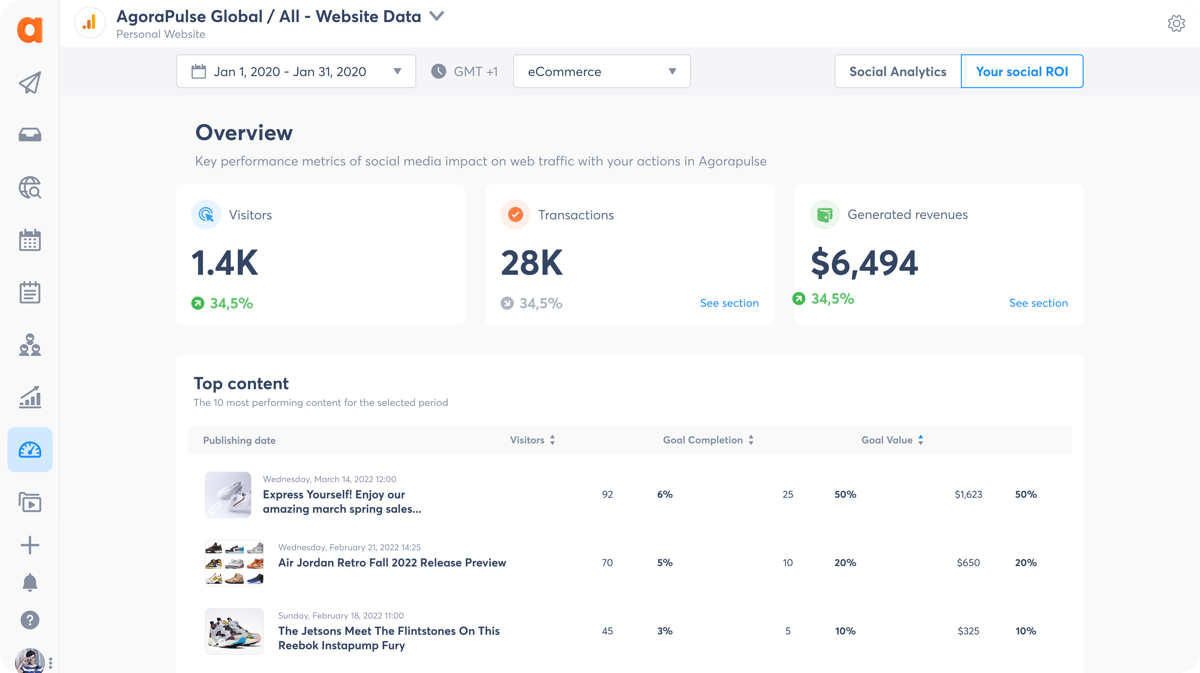 Image source: G2
Image source: G2
Agorapulse is a social media management tool that includes a variety of features like scheduling, reporting, and a unified inbox for managing interactions.
While it’s a popular choice among businesses, its focus on offering a wide range of functionalities can sometimes come at the expense of in-depth monitoring capabilities.
Key Features
- Competitor analysis tools: Provides basic competitor analysis features so you can track how your brand stacks up against others in your industry.
- Social media scheduling and posting: Includes a scheduling tool that lets you plan and publish posts across multiple social networks from a single dashboard.
- Reporting and analytics options: Standard analytics cover essential metrics like engagement rates, reach, and follower growth. Although the reporting features provide useful insights into social media performance, they may not be as comprehensive as those offered by more specialized monitoring tools.
Pros
- Simple to use
- Convenient for managing multiple accounts
- Offers standard features like scheduling and reporting
Cons
- Basic plans lack advanced monitoring features
- Costs can add up quickly for small businesses
- Some users find the interface a bit cluttered
Pricing
Agorapulse’s pricing is on the higher side, especially for small businesses or startups.
It offers several plans, starting with a Standard Plan at $99 per user per month, which includes basic features suitable for smaller teams.
For larger teams or businesses needing more advanced options, the Professional Plan is priced at $149 per user per month. Agorapulse also provides a custom Enterprise plan for companies that require additional features, with pricing available upon request.
3. Mention
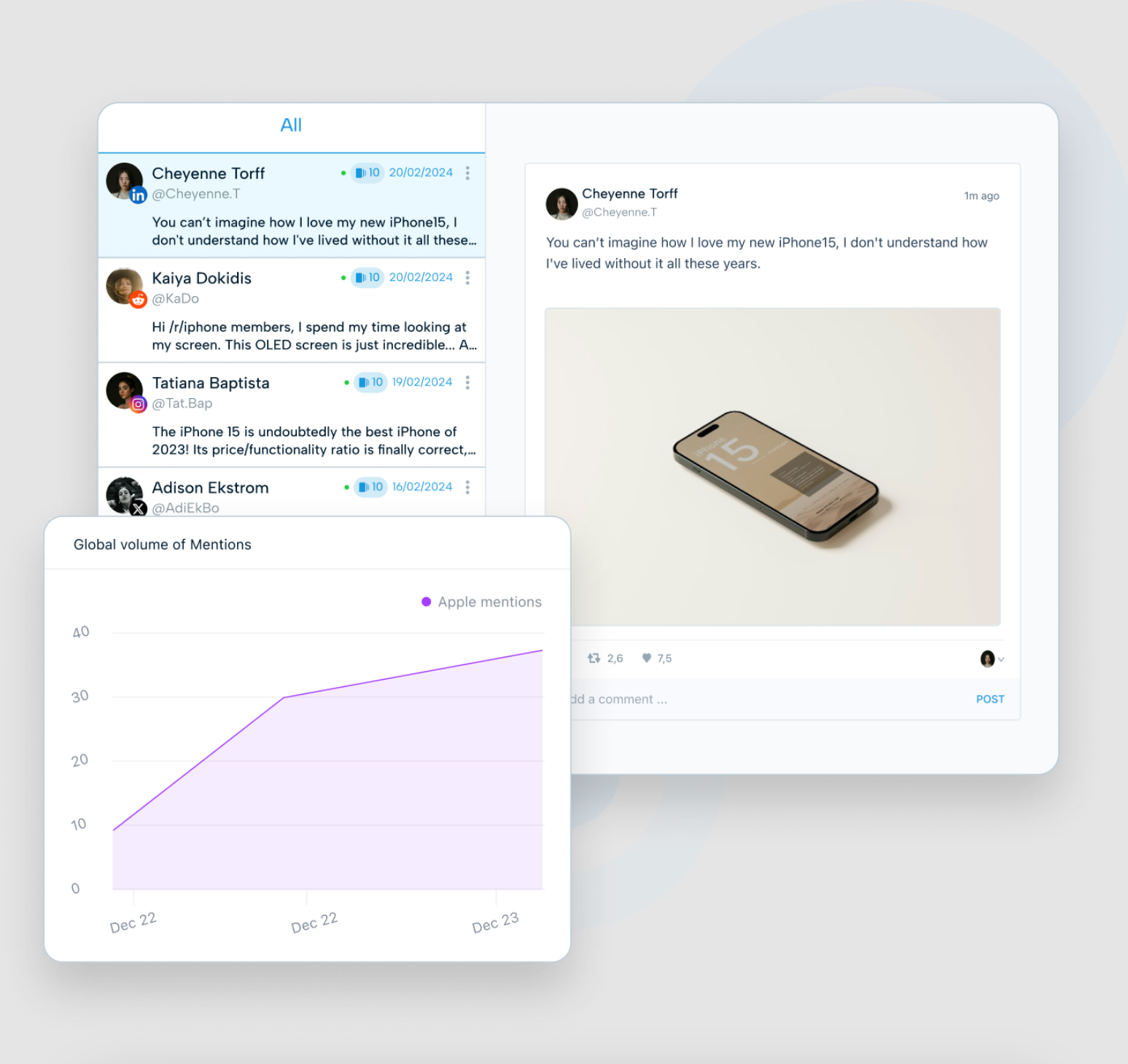
Image source: G2
Mention is a real-time social media monitoring tool designed to help businesses track their online presence and engage with their audience more effectively.
It focuses on delivering fast, accurate alerts about your brand mentions, which makes it a solid option for those who need to stay on top of social conversations as they happen.
Key Features
- Real-time brand monitoring: Tracks your brand’s mentions instantly across various social media platforms, forums, blogs, and news sites. This feature lets you react quickly to both positive and negative comments.
- Keyword and hashtag tracking: Allows you to monitor conversations, specific keywords, hashtags, or topics relevant to your business or industry. This helps you stay informed about trending discussions and popular conversations that could impact your brand.
- Competitor analysis: Offers basic competitor analysis that lets you see how your brand’s performance compares to others in your field.
Pros
- Fast and accurate real-time alerts
- Easy setup with an intuitive interface
- Effective keyword and hashtag tracking
Cons
- Limited historical data available
- Higher pricing tiers can be expensive
- Some users report occasional data inconsistencies
Pricing
Mention’s pricing starts with a Solo Plan at $49 per month, suitable for individual users or small businesses with basic monitoring needs. The Pro Plan, aimed at growing teams, is available at $99 per month and includes more advanced features.
For larger organizations requiring custom solutions, Mention offers an Enterprise Plan with pricing details available upon request.
4. Zoho Social
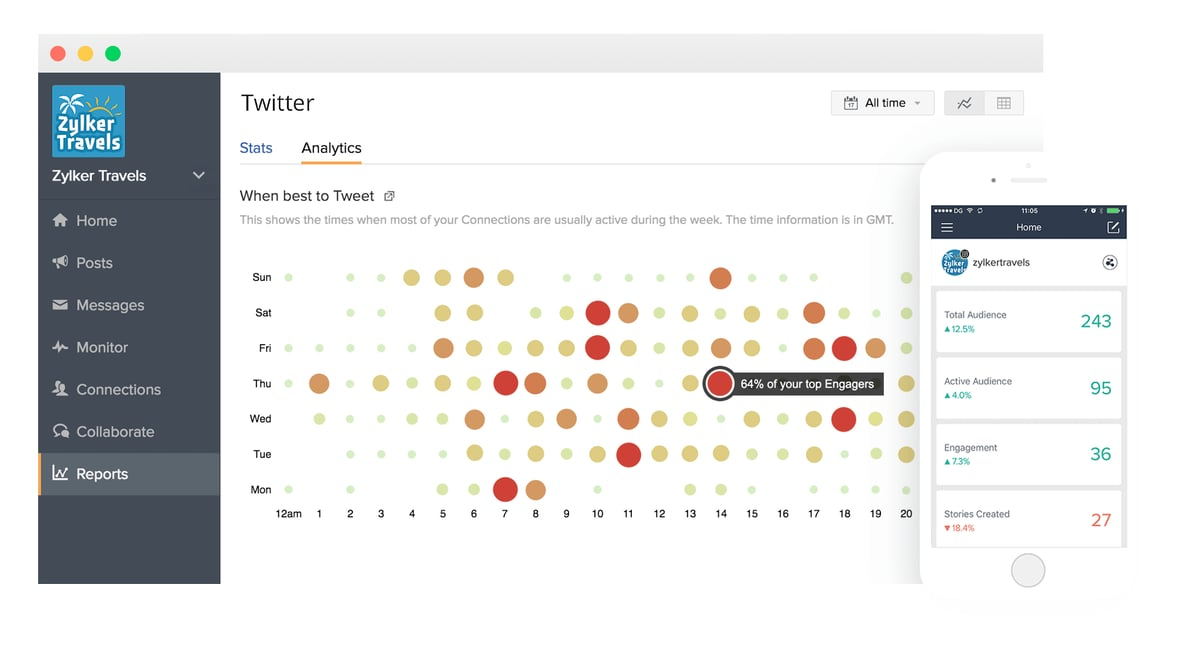 Image source: G2
Image source: G2
Zoho Social is a solid pick for small and medium-sized businesses that want an easy way to manage their social media networks.
It works with the rest of the Zoho suite, so if you’re already using Zoho’s other tools, it can be a natural fit. While it has plenty of useful features for managing posts and tracking performance, it might not have everything a larger company needs for in-depth monitoring.
Key Features
- Social media scheduling and publishing: Lets you schedule and publish posts across different platforms from one place. Its content calendar gives you a clear view of your posting schedule, making it easier to plan and organize your campaigns.
- Advanced analytics and reporting: Provides detailed reports to track how your social media is doing, covering metrics like engagement rates, reach, and follower growth. These insights help you see which posts are hitting the mark so you can adjust your strategy.
- Team collaboration tools: Comes with features that make it easy to work with your team. You can manage permissions, share updates, and collaborate smoothly, which is great if you have multiple people handling your social accounts.
Pros
- Budget-friendly plans
- Integrates well with other Zoho tools
- Simple, intuitive interface
Cons
- Missing some advanced monitoring options
- Limited data on smaller social networks
- Customer support can be slow at times
Pricing
Zoho Social has pricing plans that fit different needs, starting with the Standard Plan at $€15 per month per user, which is suitable for small teams. The Professional Plan costs $€40 per month per user and includes more features like detailed analytics and team collaboration.
For larger needs, the Agency Plan is priced at €320 per month, offering tools to manage multiple brands.
5. Cyfe
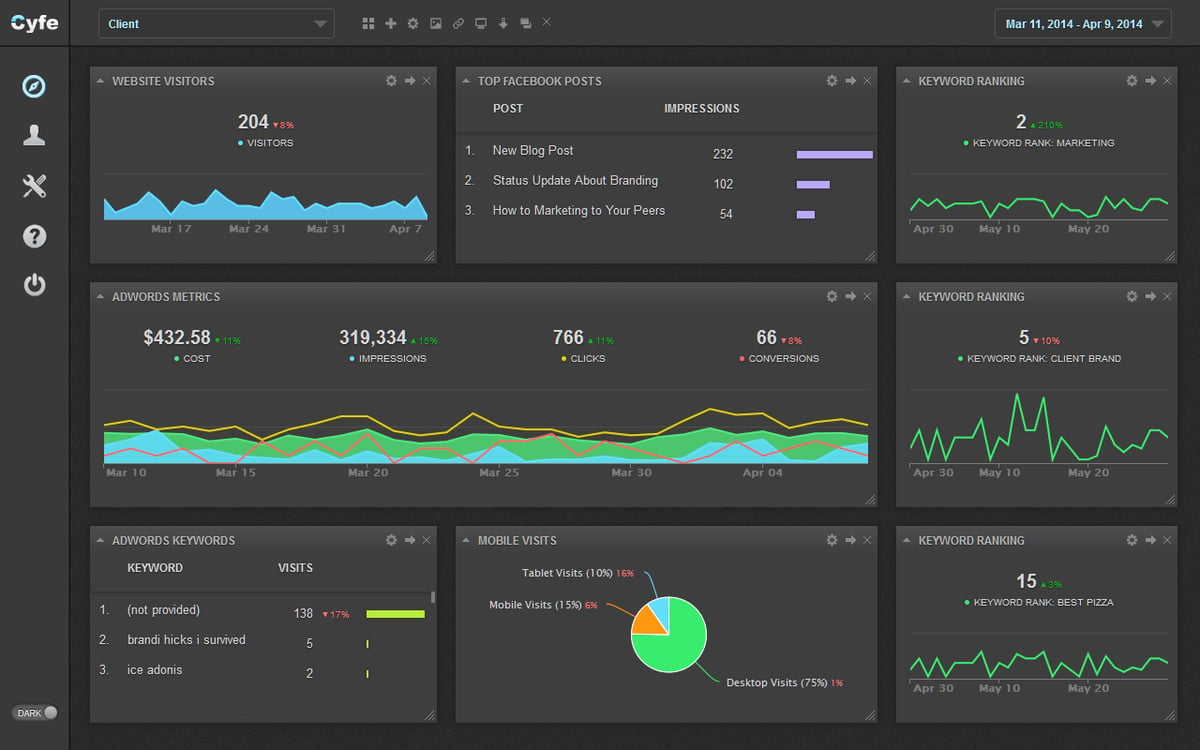 Image source: G2
Image source: G2
Cyfe is a business dashboard tool that offers social media monitoring as part of its all-in-one platform. It’s designed to bring your data together in one place, making it easier to track your brand’s performance across social media channels alongside other business metrics.
While it’s suitable for those who want a comprehensive view of their online presence, its social media-specific features aren’t as advanced as some dedicated tools.
Key Features
- All-in-one dashboard: Pulls together data from multiple sources, not just social media. You can track social mentions, website traffic, sales data, and more, all from a single dashboard, giving you a complete picture of your brand’s performance.
- Custom widgets: Lets you create custom widgets for tracking different social media marketing metrics. You can set up widgets for social media mentions, keyword tracking, and competitor activity, all tailored to fit your specific needs.
- Social media analytics: Includes basic social media analytics to help you keep an eye on your brand’s engagement and reach. It might not have the most in-depth analysis, but it does a solid job of giving you a quick overview of your social media performance.
Pros
- Combines data from multiple business areas in one place
- Customizable widgets for personalized dashboards
- Affordable pricing for small businesses
Cons
- Social media features are less advanced compared to specialized tools
- Limited in-depth analytics for social channels
- Can feel cluttered if not well-organized
Pricing
Cyfe offers straightforward pricing with its Premium Plan at $19 per month, which includes unlimited dashboards and widgets.
Cyfe also has a free plan with limited features, which can be a good starting point for those who want to test the platform before upgrading.
How to Find the Best Social Media Monitoring Tool For Your Business
Choosing the right social media management platform for your business can seem tricky, but it’s all about knowing what you need and what each tool offers.
Here are some tips to help you make the best choice:
Set Clear Goals
Before you dive into choosing a social media monitoring tool, it’s important to first figure out what you want to achieve. When you know your goals, you’ll be able to pick the right tool that supports your needs.
Here are a few things to consider:
- Engagement: If your goal is to maximize engagement with your target audience, look for a tool that tracks likes, shares, and comments and helps you respond quickly to followers.
- Brand mentions: If you want to keep tabs on your brand’s reputation, choose a tool that monitors mentions across platforms in real time.
- Competitor tracking: Interested in what your competitors are up to? Find a tool that lets you track their social media activity and performance.
- Customer feedback: If customer satisfaction is a priority, pick a tool that helps you track reviews, complaints, and customer sentiment.
Knowing your goals upfront makes it easier to choose the best tool for your business. It’ll save you time and make sure the tool you pick actually helps you get where you want to go.
Look at Key Features
Different tools come with different features, so it’s essential to know which ones matter most to your business.
Features like real-time tracking, sentiment analysis, competitor insights, and detailed reporting can greatly improve the effectiveness of your social media presence management.
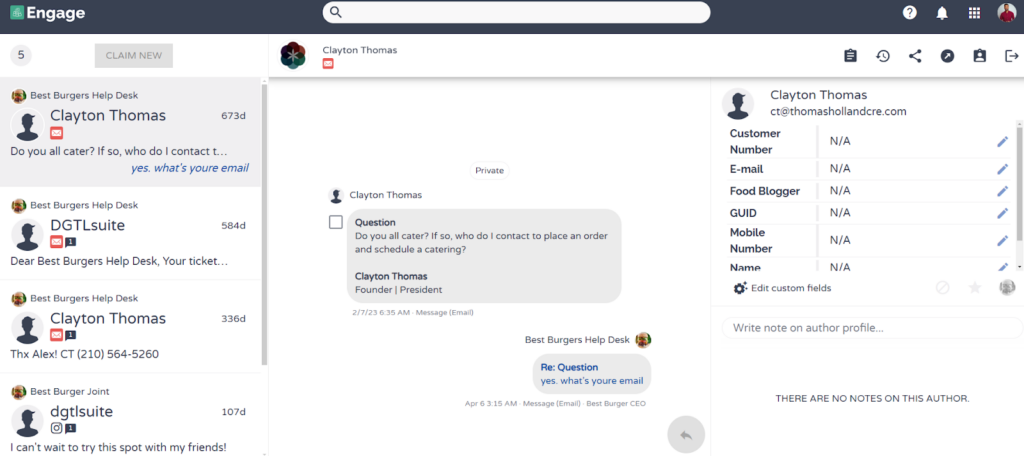
Consider Your Budget
Social media monitoring tools come in various price ranges, so it’s important to find one that fits your budget without compromising on essential features.
If you’re a small business, look for affordable options that cover your basic needs, like tracking mentions and engagement. For example, DGTLsuite offers individual plans for its Create, Engage, and Analyze platforms, so you can pick and choose whatever you need.
Larger companies may require more advanced tools with additional features like in-depth analytics or competitor monitoring, which may come at a higher price.
Many tools offer free trials, so take advantage of these to test the features and see if the tool provides enough value before committing to a paid plan.
Check for Ease of Use
The social media monitoring tool you choose should be simple to use, even if you’re not a social media expert. A user-friendly interface makes it easier to navigate and access the features you need without a steep learning curve.
Look for a tool that offers intuitive dashboards, clear menus, and easy-to-understand reports. This way, you can focus on using the tool to gather insights and track performance rather than wasting time trying to figure out how it works.
Integration Capabilities
When choosing a social media monitoring tool, make sure it integrates well with other software you already use, like your CRM, email marketing platforms, or analytics tools.
Seamless integration means you can pull all your data together in one place, giving you a fuller picture of your brand’s performance. This allows you to combine social media insights with customer data, email campaigns, and more—helping you make smarter, data-driven decisions.
A tool that works well with your existing systems can save you time and make sure all your business insights are connected and easy to access.
Read User Reviews
Hearing what other users have to say can give you a real sense of a tool’s strengths and weaknesses. Check out reviews on sites like G2 or Trustpilot to see how others rate the tool’s performance, customer support, and overall value.
Customer Support
Good customer support can be a lifesaver if you run into any issues while using the tool. Make sure the provider offers reliable support options like live chat, email, or phone assistance.
Best Practices for Social Media Monitoring
To make the most out of your social media monitoring efforts, it’s important to follow some best practices that keep you on track.
Know What You Want to Get Out of It
Before you dive into social media monitoring, take a minute to figure out what you actually want to accomplish. Are you trying to get more engagement? Keep an eye on your competitors? Or maybe make sure you’re staying on top of customer feedback? Knowing your focus makes everything so much easier.
For example, if you’re all about customer sentiment, you’ll want a tool that tracks mentions and helps you see what people are saying. If it’s competitor insights you’re after, look for something with strong analysis features.
Having a clear goal keeps you on track and makes sure you’re not just monitoring for the sake of it.
Use the Right Keywords
It’s not enough to just monitor your brand name—you need to think bigger! Keep an eye on relevant keywords, industry-specific hashtags, and even common misspellings of your brand or products.
This way, you’ll capture conversations that might not tag you directly but are still highly relevant to your business.
Monitor in Real-Time
Timing is everything on social media. Keeping an eye on conversations in real time allows you to respond quickly to questions, comments, or even complaints. When you reply promptly, your audience knows you’re paying attention, which builds trust and strengthens your connection with them.
Monitoring social media in real time also helps you catch potential issues before they escalate and capitalize on trending topics that can boost your engagement.
Whether it’s a customer asking for help or a viral moment related to your industry, being quick on the draw makes a big difference in how your brand is perceived.
Get Involved in the Conversation
Monitoring social media isn’t just about listening—you also have to engage with your audience. Liking, commenting, and sharing posts show your audience that you’re paying attention and that you value their input.
By jumping into conversations, you can turn passive followers into active participants and spark loyalty and trust. Whether it’s a shoutout, a question, or even a lighthearted comment, being present keeps your brand top-of-mind and relatable.
Keep Tabs on Your Competitors
Social media tracking doesn’t stop with your own brand. Keep a close watch on what your competitors are doing.
Are their campaigns resonating with their audience? Are there areas where they’re falling short? Learning from their successes and missteps can give you valuable insights to fine-tune your own strategy.
Competitor analysis helps you spot trends, fill gaps in the market, and find new opportunities to stand out.
Focus on What Matters Most
Not every comment or mention requires a response. When monitoring social media, prioritize the interactions that have the biggest impact on your brand. Address customer complaints quickly, engage with valuable feedback, and respond to questions that show your audience you’re listening.
This way, you can manage your time effectively and focus on the conversations that shape your brand’s reputation. Be selective while still being present where it matters most.
Upgrade Your Social Media Presence With DGTLsuite
Picking the right social media monitoring tool can really change how you connect with your audience, keep track of your brand’s performance, and fine-tune your strategy.
While there are plenty of options to choose from, DGTLsuite offers a well-rounded solution that’s built to do more than just monitor.
With its easy-to-use tools for content scheduling, real-time engagement, and team collaboration, DGTLsuite helps businesses get the most out of their social media efforts.
If you’re ready to level up your social media strategy, give DGTLsuite a try!
Check out a free demo or sign up for one of their plans to see how it can help boost your brand’s online presence.
FAQs About Social Media Monitoring Tools
What is the best social monitoring tool?
The best social monitoring tool depends on your needs, but DGTLsuite is a top choice. It offers real-time monitoring, sentiment analysis, and a unified inbox for managing all your social media conversations in one place.
What is a social media monitoring tool?
A social media monitoring tool helps you track mentions, hashtags, and conversations about your brand, competitors, or industry. It’s designed to keep you informed about what’s being said online so you can engage with your audience and make informed decisions.
How do you monitor your social media?
You can monitor your social media by using tools like DGTLsuite to track mentions, comments, hashtags, and messages in real time. These tools also provide analytics to help you understand trends and measure your performance.
How do I create a social media monitoring tool?
Creating your own social media monitoring tool requires programming skills and access to APIs from platforms like Twitter (X) or Instagram. Alternatively, using ready-made tools like DGTLsuite is faster and ensures you get all the features you need without the hassle of building one from scratch.
What are social media listening tools?
Social media listening tools are platforms that track and analyze conversations, mentions, and trends related to your brand, competitors, or industry across social media. They help you understand what people are saying, identify customer sentiment, and uncover valuable insights to improve your strategy.
